Cutting edge science in a supportive environment
The SAAO offers students the opportunity to work with leading researchers on cutting edge astronomy and instrumentation projects. These cover observational and theoretical aspects of stellar and extragalactic astronomy, astronomical instrumentation and computer modelling. Many projects involve combining and analysing data from different wavelengths, e.g. optical data from SAAO/SALT with radio data from MeerKAT and/or X-ray measurements from spacecraft. There are also numerous opportunities for collaboration with national and international partners. Details are given in the project descriptions.
Projects
PhD
| Supervisor | Project title | University |
|---|---|---|
| David Buckley | Transients in the Rubin Observatory LSST era | UCT, UFS or NWU |
| Matthew Bershady | Spatial Heterodyne Spectrometer to Search for Missing Baryons: Design, development and commissioning of a Spatial Heterodyne Spectrometer for SAAO’s Sutherland telescopes to detect diffuse nebular emission around galaxies | UCT |
| Matthew Bershady | SALT Slit-Mask IFU for Nearby Galaxy Studies: Design, development and commissioning of a fibre slit-mask integral-field unit for SALT prime-focus spectrograph | UCT |
| Paul Groot | Ultracompact binaries in the southern hemisphere | UCT |
| Paul Groot | Fast transients in the local universe | UCT |
| Retha Pretorius | The Galactic low mass X-ray binary population | Any |
| Shazrene Mohamed | Supercomputer models of dying stars | Any |
| Shazrene Mohamed | Explosive transients from stellar collisions | Any |
| Vanessa McBride | Extended radio sources in the SMC | UCT |
| Vanessa McBride | Accretion in Be X-ray binaries | UCT |
MSc
| Supervisor | Project title | University |
|---|---|---|
| David Buckley | Transients in the Rubin Observatory LSST era | UCT, UFS or NWU |
| Itumeleng Monageng | Long-term multiwavelength monitoring of gamma-ray binaries | UCT |
| Lee Townsend | Disc variability in Be/X-ray binaries | UCT |
| Lee Townsend | Population synthesis studies of high-mass X-ray binaries | UCT |
| Moses Mogotsi | Optical Kinematics in a subsample of MHONGOOSE Galaxies | Any |
| Moses Mogotsi | Feedback in SUNBIRD Galaxies | Any |
| Paul Groot | Transient and variables in star clusters | UCT |
| Paul Groot | Fast transients in the local universe | UCT |
| Rajeev Manick | In search of binaries among RV Tauri stars without dust | UCT |
| Retha Pretorius | A new spectrograph: Characterization and early transient science | Any |
| Retha Pretorius | Exploiting MeerKAT’s discovery of vast numbers of radio point sources | Any |
| Shazrene Mohamed | Supercomputer models of dying stars | Any |
| Shazrene Mohamed | Explosive transients from stellar collisions | Any |
| Vanessa McBride | Extended radio sources in the SMC | UCT |
Application process
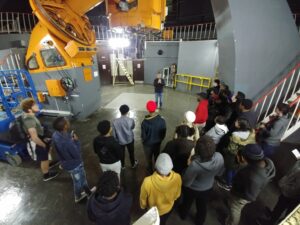 To do postgraduate research at SAAO students must register with a South African University and those who require funding must apply to the NRF, following the standard procedures, or apply for the 2021 SALT-SAAO Prize Scholarship for PhD or MSc (only one of each available). The project opportunities (project lists) are the same for NRF and the SALT-SAAO bursaries.
To do postgraduate research at SAAO students must register with a South African University and those who require funding must apply to the NRF, following the standard procedures, or apply for the 2021 SALT-SAAO Prize Scholarship for PhD or MSc (only one of each available). The project opportunities (project lists) are the same for NRF and the SALT-SAAO bursaries.
Note that NRF are advising students to apply as soon as they can to prevent IT overload near the cut-off dates.
Students of any nationality are eligible to apply for NRF and SALT-SAAO bursaries, however, strong preference is given to South African citizens and permanent residents
If you are a student wishing to do research at SAAO under the (co)supervision of an SAAO staff member you should:
1) Send your CV to the SAAO staff member(s) offering the project(s) you are interested in. Discuss the research with them to determine if you have the required qualifications, skills and abilities to undertake the project. You may contact as many potential supervisors as you like.
2) If an SAAO staff member agrees to supervise you, discuss with them which university you should apply to register with.
3a) Apply to the NRF for funding through the university and send your application number to your SAAO supervisor
3b) and/or apply for the PhD/MSc SALT-SAAO Prize Scholarship.
The closing date for NRF applications via UCT is 30 June 2020, but will probably be different for other universities. Completing the NRF application will take time, and requires various documents and letters. It is essential that you complete your discussions with your potential supervisor(s) well before the deadline.
IMPORTANT: If you require NRF funding, you must ensure that you qualify for NRF support as this is the primary mechanism we have to provide you with a bursary.
Any general enquiries about postgraduate studies at SAAO should be sent to pdp@saao.ac.za.
Working at the SAAO
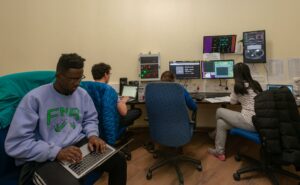 SAAO’s headquarters are situated in the historic suburb named after it – Observatory. The park-like grounds, bordered by a wetland, are a peaceful environment conducive to study and research. Regular colloquia and other science meetings provide opportunities to engage with staff, students and visiting scientists, including those from UCT, UWC and SARAO, which are nearby.
SAAO’s headquarters are situated in the historic suburb named after it – Observatory. The park-like grounds, bordered by a wetland, are a peaceful environment conducive to study and research. Regular colloquia and other science meetings provide opportunities to engage with staff, students and visiting scientists, including those from UCT, UWC and SARAO, which are nearby.
Training and service work opportunities are offered in observing, data analysis (including supercomputing and handling big data), coding (e.g. Python, Java, C++), the design and construction of astronomical instrumentation, web development, English writing and verbal communication skills, public relations and outreach. Students fluent in SA languages other than English are encouraged to help with writing/translating education material. The International Astronomical Union Office of Astronomy for Development (IAU OAD www.astro4dev.org) is based at SAAO and students are also encouraged to help them with resource development. The African Astronomical Society (AfAS) is also hosted on the SAAO site, facilitating opportunities for collaboration across the continent.
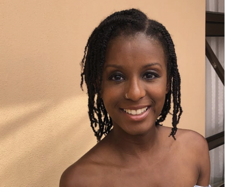
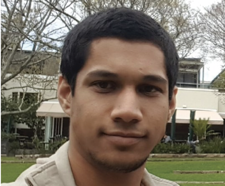
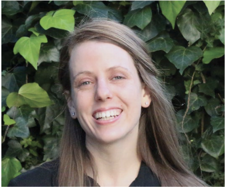
In addition to their research-supervisor, students benefit from the support of SAAO administrative and technical staff and will have access to a mentor (usually an early career member of the research staff or a postdoc).
Most students supervised by an SAAO staff member are expected to spend at least half their time at SAAO (Cape Town), but are encouraged to visit their universities and to attend relevant conferences and meetings. They will be asked to sign an MoU with SAAO and their supervisor that commits them to at least 40-hours per annum service work for SAAO. In return they will be provided with:
- Office space and resources
- Computer resources; details depend on the research project
- Funding for supervisor-approved observing
- Funding for supervisor-approved conference or workshop attendance, national and/or international
- Medical insurance
- One return trip to their home, at the start and end of their studies, if they are not from the Cape Town area
- Other approved research expenses
- Grant top-ups for appropriately qualified students receiving only partial NRF funding, if no other funding available (students who are eligible for full NRF funding must apply for it).
In addition, international students will be funded for their visa, return air ticket to their place of residence and the international component of their university registration fee.

